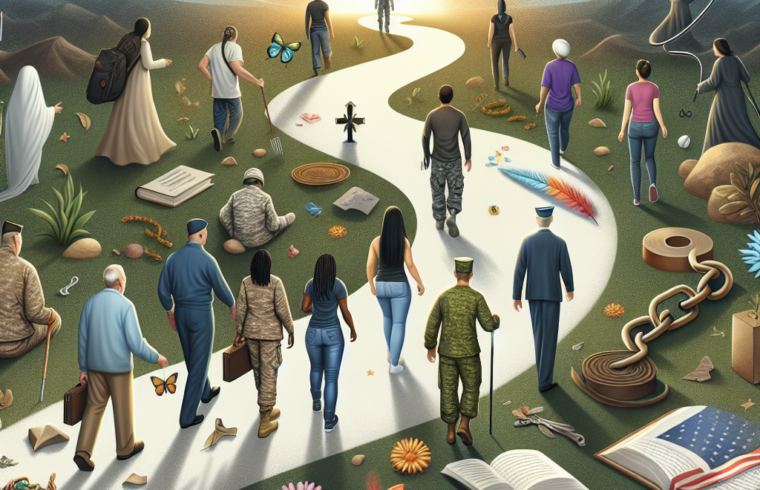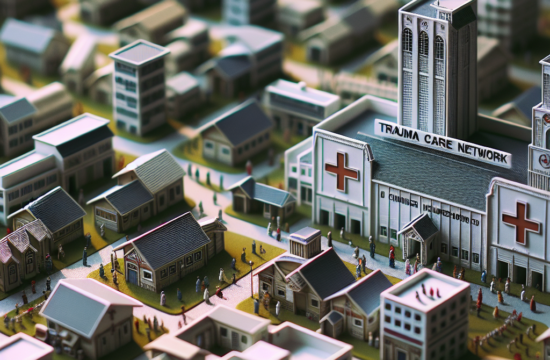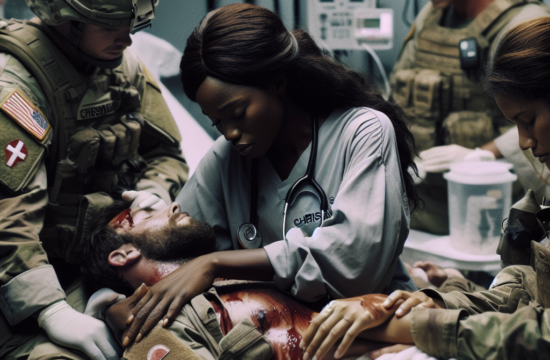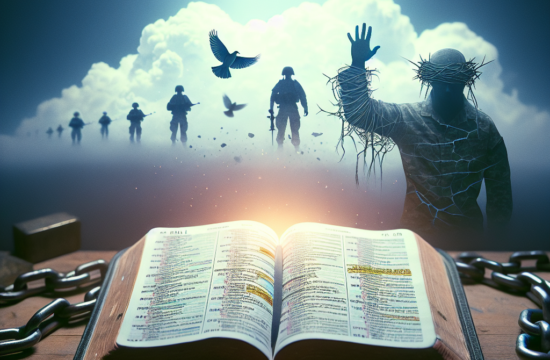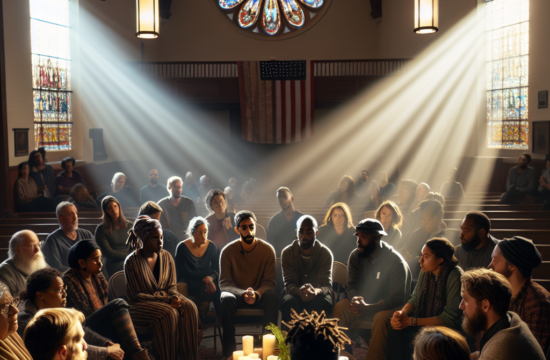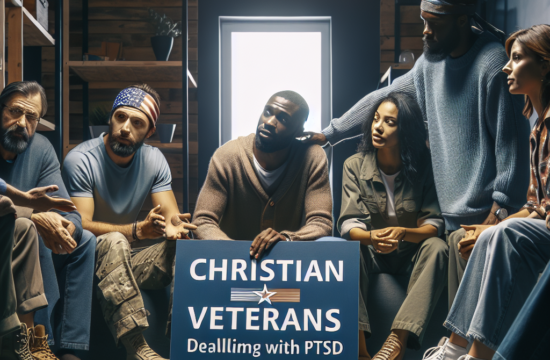What Happens When Veterans Focus on Healing from Combat Experiences
- Impact of Healing on Veterans
- Emotional Resilience in Veterans
- Support Systems for Combat Veterans
- Personal Growth through Healing
Impact of Healing on Veterans
Understanding the Healing Process
As I journey through life, one of the most eye-opening experiences I’ve had is understanding how vital the healing process is for veterans. Healing from combat isn’t just physical; it’s a holistic journey that includes mental, emotional, and spiritual recovery. It’s a path that often requires patience and self-compassion.
==> Thank you for reading this post! Click Here If you are looking for support and Victory over PTSD.
The first step in this process is acknowledging the trauma. Many veterans find it challenging to admit the scars of war, whether they’re visible or hidden. This acceptance is a fundamental building block in promoting resilience. Once you start to recognize and confront these feelings, the door opens to deeper healing.
I’ve seen many veterans, including myself, transform their pain into power. The act of seeking healing can significantly improve quality of life. It’s like shedding an old skin—often, you find a version of yourself that’s more in tune with who you are meant to be.
The Role of Physical Health in Healing
Physical health plays a significant role in overall healing. I’ve experienced firsthand how maintaining a healthy lifestyle, through exercise and nutrition, can positively affect my mental state. It’s not just about lifting weights or running marathons; it’s about finding what feels good for your body and committing to it.
Simply put, when I exercise, I notice an immediate boost in my mood. It’s like getting a little dose of happiness from my brain. This chemical reaction can assist in easing anxiety and depression—two common battles for many veterans. Even a brisk walk can do wonders!
Therefore, focusing on your health helps better your mind. I would encourage any veteran looking for healing to try finding a physical activity that resonates with them—even if it’s just dancing in your living room to your favorite tunes. Trust me, it helps!
Spirituality and Healing
Spirituality is another aspect I find essential in healing. For some, it can be faith or religion; for others, it’s a personal connection to nature or the universe. Embracing spirituality gives many veterans a purpose beyond the battlefield.
Personally, I find solace in quiet moments spent in nature. Hiking or sitting by a lake allows me to reflect and center myself. Nature offers this incredible peace and helps me appreciate the beauty of life, which can often be overshadowed by darker thoughts.
If you’re exploring your spirituality, I recommend starting small. Maybe try meditating or engaging in activities that foster mindfulness. The more you connect with that inner self, the more clarity you’ll find regarding your experiences.
Emotional Resilience in Veterans
Building Emotional Strength
One significant takeaway for many veterans is learning to build emotional strength after combat experiences. Resilience isn’t a magical trait; it’s something we cultivate over time through experiences and coping strategies.
I’ve learned that facing adversity and walking through the fire can mold us into stronger individuals. It’s like the old saying goes—what doesn’t kill you makes you stronger. Each challenge adds another layer of resilience to your character.
However, it’s crucial to recognize that resilience also requires vulnerability. Sharing your story or asking for help are powerful acts. I’ve found that when I open up, it invites others to do the same, fostering connection and understanding.
Overcoming Stigma Surrounding Mental Health
There’s a significant stigma surrounding mental health in the military, which can hinder healing. Many veterans, myself included, may feel pressured to appear strong when, in reality, we’re struggling.
Tackling this stigma starts with conversation. Normalize talking about mental health, whether with fellow veterans or in your community. The more we discuss our experiences openly, the more we diminish the stigma surrounding mental health. It’s okay to seek help; it can be an act of strength and bravery.
I also encourage veterans to advocate for themselves in therapy and support groups. Don’t hesitate to voice what you’re feeling. Remember, it’s your journey, and your voice matters!
The Power of Community Support
Community support is indispensable on the road to emotional resilience. I’ve been lucky to connect with various groups, both in-person and virtually, filled with veterans who share similar experiences. There’s something incredibly comforting about knowing you’re not alone.
These connections foster a sense of belonging, which is crucial for healing. Whether it’s sharing stories, participating in group activities, or simply a listening ear, being part of a supportive community can significantly enhance the healing journey.
I urge veterans to actively seek out these communities, whether through local organizations, online forums, or social media groups. Don’t underestimate the power of finding your tribe.
Support Systems for Combat Veterans
Finding Professional Help
Navigating the various avenues of professional help can be overwhelming, but it’s worth the effort. I’ve had my fair share of mental health professionals, and each experience has taught me something valuable.
Whether it’s a psychologist, psychiatrist, or counselor, finding someone you click with is vital. Remember, this person can be a pivotal piece in your healing puzzle. Don’t settle for less; you deserve the best support on your journey.
Get Started with Recovery! Visit us for more Information and Support
Many veterans have found success with therapy methods like EMDR or Cognitive Behavioral Therapy. Each therapy style offers unique tools that help address trauma, and exploring different options can lead you to what fits your needs best.
Engaging with Peer Support Programs
Beyond professional help, military peer support programs have been a lifesaver for many. These programs connect veterans with others who have faced similar challenges and can provide insights, camaraderie, and hope.
I’ve participated in several peer-led groups, and the connections made there are genuine. It’s not therapy; it’s a gathering of folks leaning on each other, sharing laughs, tears, and everything in between. That’s the magic of peer support—connecting through shared lived experiences.
Whether it’s through local veterans organizations, national programs, or online communities, I cannot stress enough how essential these connections can be.
Building a Strong Personal Support Network
While professional help is critical, the importance of a solid personal support network cannot be overlooked. Friends, family, or other veterans can provide love, understanding, and companionship.
I’ve learned that sometimes simply being open with loved ones about what I’m going through allows them to better support me. Communication is key! I always recommend letting trusted individuals know how they can help, whether that means just checking in or joining me for a walk.
Building this network takes time and trust but can lead to a wonderfully supportive atmosphere that is crucial for healing. Surround yourself with people who uplift you.
Personal Growth through Healing
Transforming Pain into Purpose
One of the most profound realizations I’ve had is how healing leads to personal growth. It’s all about transforming that pain into purpose. I firmly believe that pain can mold us into better, more compassionate individuals if we allow it to.
I recall how sharing my journey inspired some friends who faced their own challenges and started their paths to healing. There’s power in stories, and by embracing our struggles, we can motivate others to confront theirs. This collective healing can create a ripple effect that benefits our broader communities.
This kind of transformation also broadens your perspective on life and teaches you valuable lessons about resilience and empathy that can guide you in the future. It can be a truly beautiful journey to embark on!
Setting New Goals and Aspirations
Healing often opens doors to reevaluating our goals in life. For many veterans like me, the transition from military life can trigger a rediscovery of passions and hobbies we might have set aside.
I’ve found immense joy in developing new skills, whether it’s taking up painting or volunteering in my community. Setting and working toward new goals has a therapeutic effect that solidifies the healing process.
Even if these goals seem small, they’re stepping stones toward greater fulfillment. So don’t hesitate to chase after those dreams, no matter how far away they seem.
Embracing Change and New Perspectives
Finally, embracing change through healing can unearth a newfound appreciation for life. Each challenge faced in the healing process teaches us to adapt and see things differently. It’s about finding beauty in the ordinary.
I never thought I could look back at certain combat experiences without resentment or pain, but through healing, I’ve learned to view them as crucial parts of my story, vital for growth and learning. That shift in perspective is liberating.
Life after combat doesn’t have to be filled with regret. It can be loaded with opportunities for joy, compassion, and connection—even in the face of the biggest challenges. The key is to keep moving forward.
Frequently Asked Questions
What role does community play in a veteran’s healing process?
Community plays a pivotal role by providing support, understanding, and camaraderie. Connecting with others who have shared experiences helps veterans feel less isolated and more understood.
How can veterans find professional help?
Veterans can start by contacting local veterans organizations, reaching out to their healthcare providers, or exploring online resources dedicated to mental health services tailored for veterans.
What are some ways to develop emotional resilience?
Developing emotional resilience can be achieved through shared experiences, therapeutic practices, and keeping open lines of communication. Simply sharing your story can strengthen both your resilience and others’.
What is the significance of setting new goals after military service?
Setting new goals after military service allows veterans to redefine their purpose, allowing for personal growth and fulfillment. It provides a sense of direction and helps navigate the transition into civilian life.

